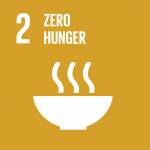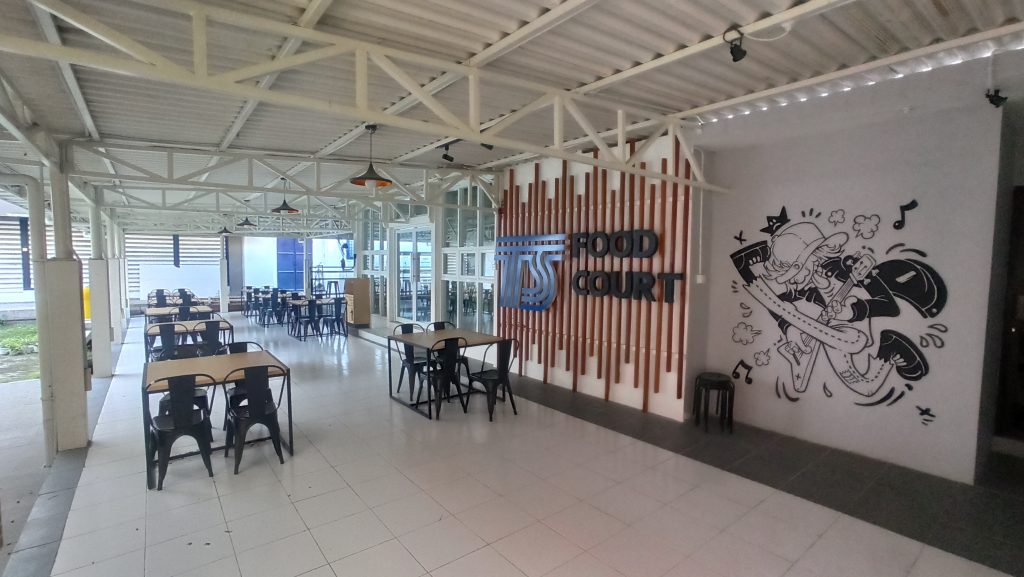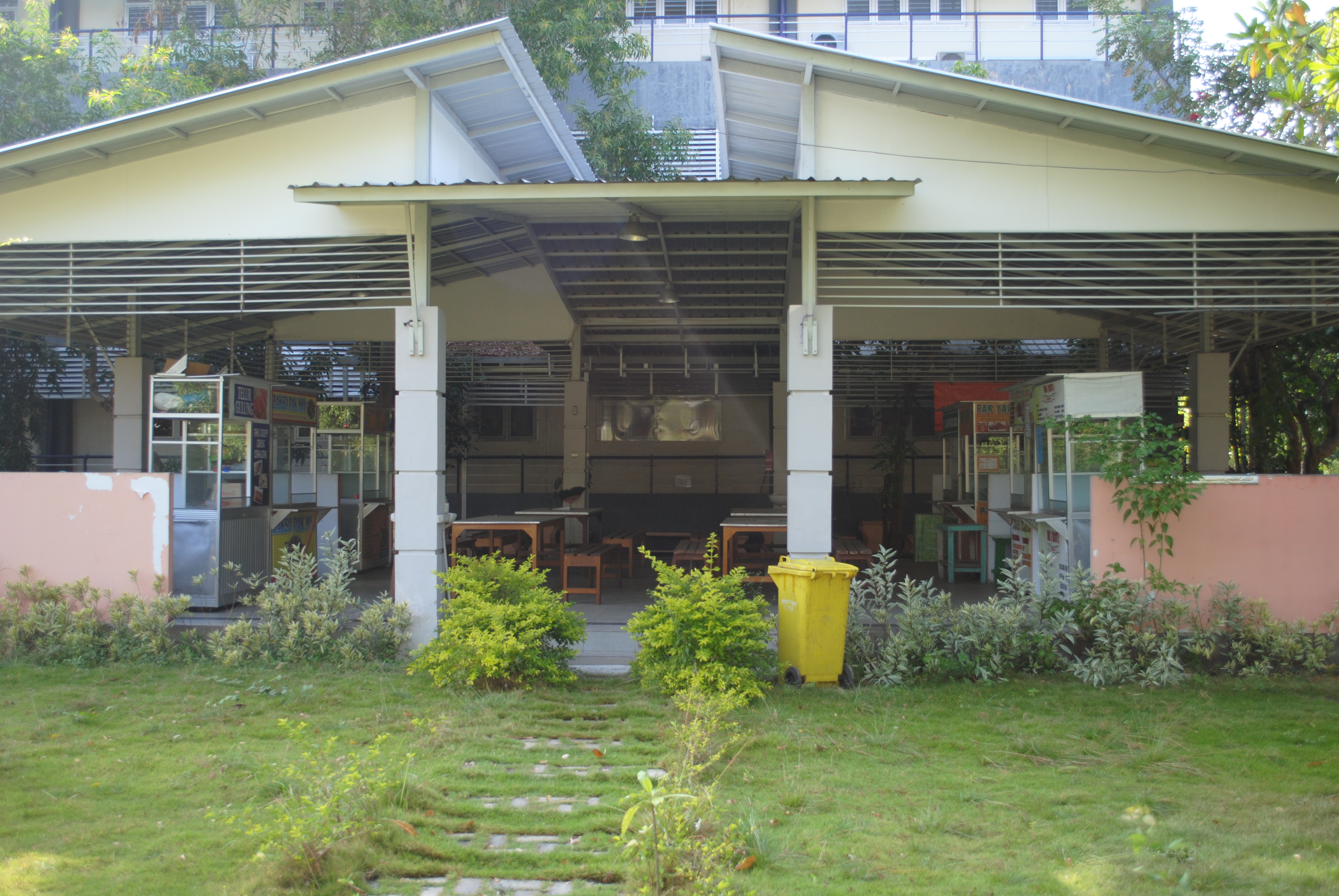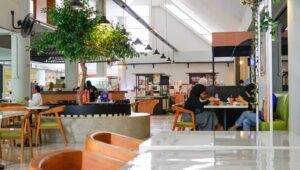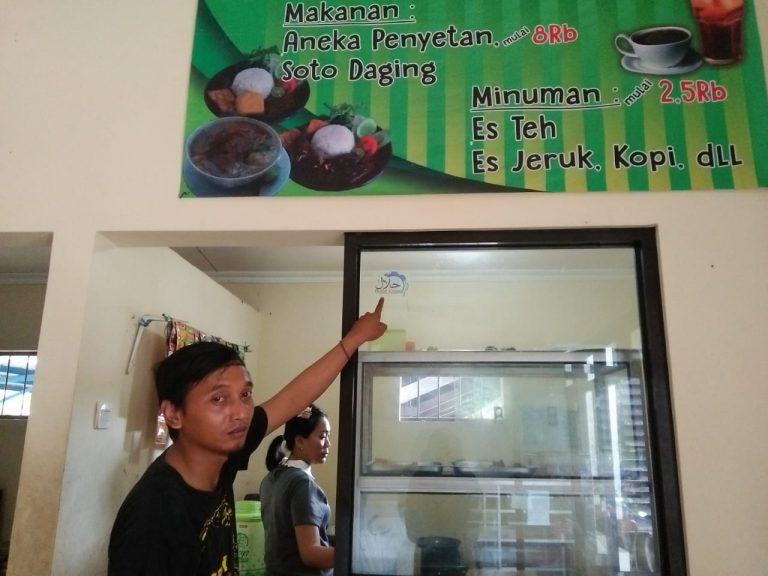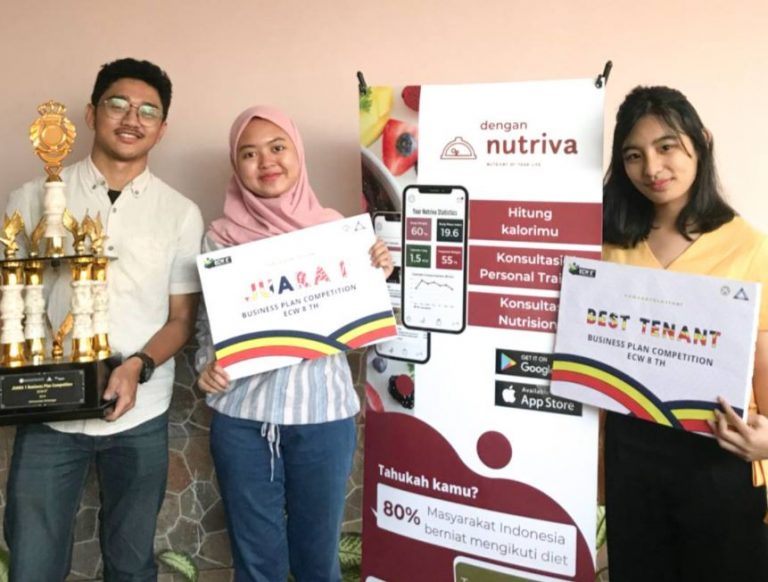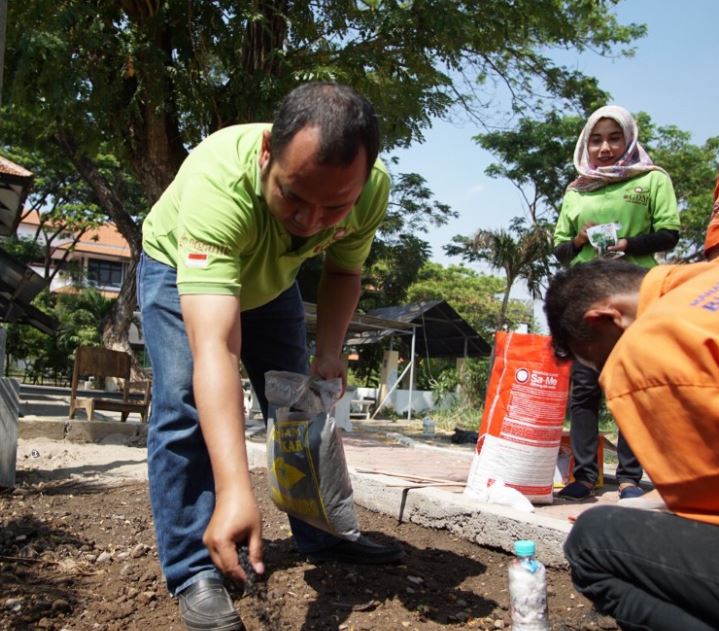“The ability to feed the world is a key element of sustainable development. If done right, agriculture, forestry and fisheries can provide nutritious food for all. At the same time it can ensure rural development with people at the centre of the process, supporting the incomes of those who rely on agriculture. Universities need to be able to demonstrate how they are contributing to end hunger, achieve food security and improved nutrition and promote sustainable agriculture.”
(THE Impact Rankings)
SDG 2: ZERO HUNGER
Campus Food Waste
Waste Management
Having initiatives towards sustainable and environment friendly campus, ITS prioritizes issues such as water and air pollution reduction and waste management. The phenomenon of high level public consumption that led and impact the amount of waste with an unsettled management system concerned ITS to promote a new lifestyle in waste management. At ITS itself, waste processing is carried out with the 3R principle: Reuse, Reduce, and Recycle. The 3R principle is implemented through reducing the use of single-use materials, E-waste drop boxes and waste sorting.

Waste Disposal (Organic and Anorganic)
ITS measures the amount of waste generated and recycled across the university. Waste in the university is handled through composting and recycling, while food waste is handled through composting. The residue is sent to landfill site. ITS also has a mini waste processing center to implement organic waste treatment policy.
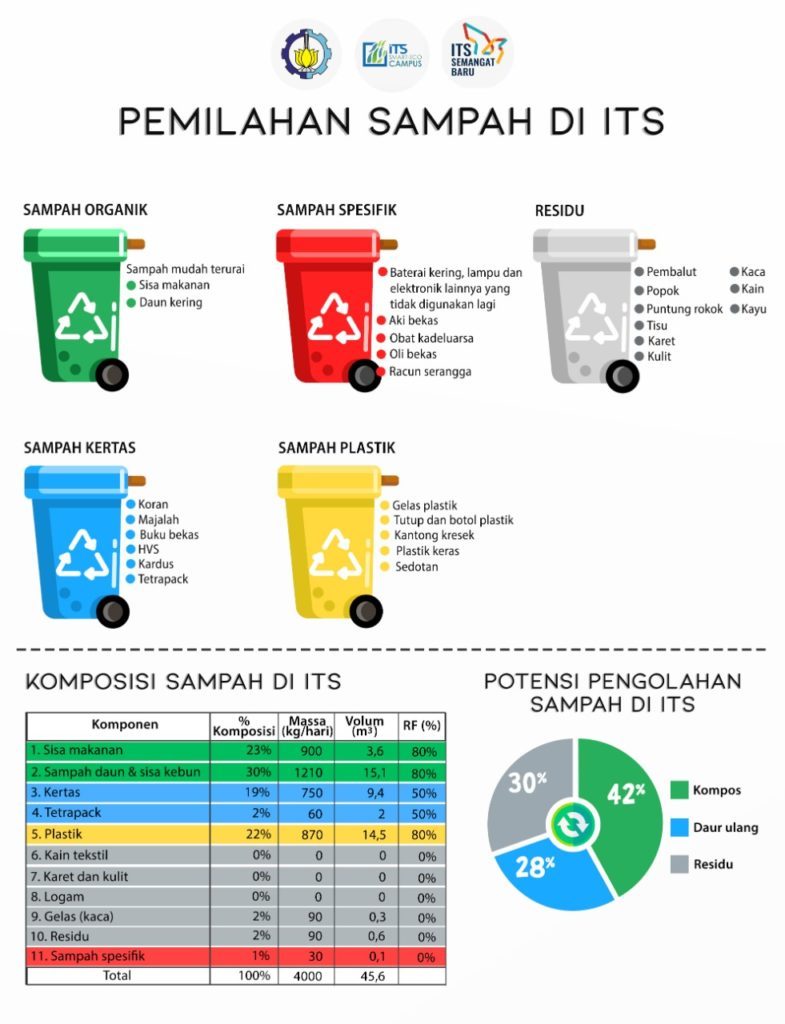
Student Hunger
SIMT ITS Public Facilities
The Interdisciplinary School of Management Technology (SIMT) provides several facilities that students and staff can utilize. These include a dining hall, sports facilities, parking lot, lobby, canteen, and prayer room. Furthermore, as a supporting facility, the Dining Room provides free dinner for all students. The dining room is located on the third floor of the Tjokroaminoto Campus. Food and drinks are served buffet style. This place can accommodate 40 people at a time. With a cozy atmosphere, the Dining Room is often used to relax, chat, or have informal discussions between students, lecturers, and staff.
ITS-Canteen
There are many choices of places to enjoy food on the ITS campus. The two largest are the Central Canteen and the Student Dormitory Canteen, besides that there are also unit canteens in each department. ITS Canteen applies the concept of Halal, Clean/Bersih, and Hygienic/Higenis (HBH).
Circular Letter of ITS Rector No. T-95007-IT2-TU.00.08-2019 about ITS’ Initiatives towards Sustainable and Environmental Friendly
Through ITS Rector’s Circular Letter No. 95007 Year 2019, the rector of ITS instructs all lecturers, education personnel, and students to establish ITS as a sustainable and environmentally friendly campus and reinforce ITS Smart Eco Campus program. The circular letter details specific initiatives and goals ITS has set in order to reduce its environmental impact and promote sustainability on campus. This includes implementing and improving environmental sanitation, promoting energy efficiency and conservation, and establishing eco-friendly transportation.
SIMT ITS Public Facilities
The Interdisciplinary School of Management Technology (SIMT) provides several facilities that students and staff can utilize. These include a dining hall, sports facilities, parking lot, lobby, canteen, and prayer room. Furthermore, as a supporting facility, the Dining Room provides free dinner for all students. The dining room is located on the third floor of the Tjokroaminoto Campus. Food and drinks are served buffet style. This place can accommodate 40 people at a time. With a cozy atmosphere, the Dining Room is often used to relax, chat, or have informal discussions between students, lecturers, and staff.
Sustainable Food Choices at ITS Campus
Providing healthy food choices on campus contributes to creating a positive and supportive environment that values the well-being of its community members. It demonstrates a commitment to promoting health and wellness beyond the classroom, fostering a culture that prioritizes physical health and mindful eating habits. Campuses that offer nutritious meal options also contribute to addressing broader public health concerns such as obesity and chronic diseases by encouraging healthier dietary patterns. ITS provides food choices especially healthy food through food outlets from several locations such as central canteen, library canteen, department canteen, etc. ITS also provides food for vegan & vegetarian.
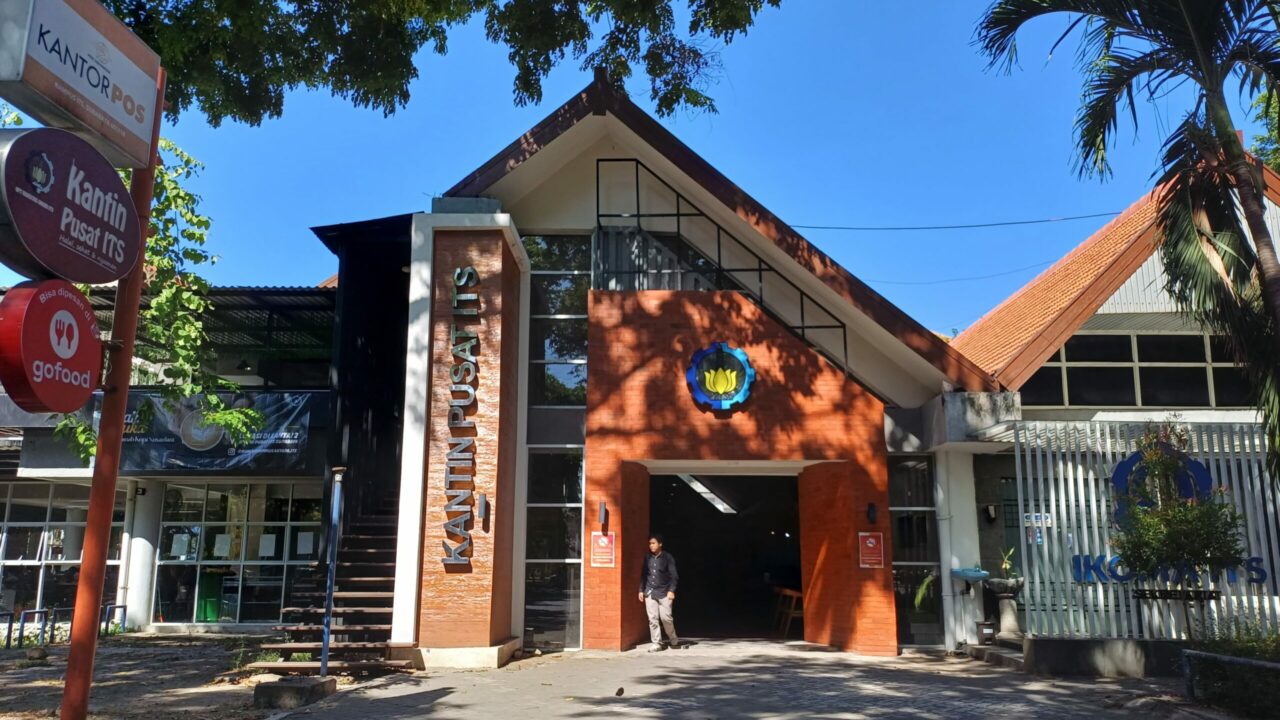
ITS Central Canteen is the First Best National KHAS Zone
The Institut Teknologi Sepuluh Nopember (ITS) Central Canteen has been awarded the first best in the Higher Education Institution (PT) category as a Snack Food Center/Canteen that Meets Sanitation Hygiene Requirements in 2022 for the National Halal, Safe, and Healthy Culinary Zone (KHAS) award. ITS Director of Cooperation and Business Management (DKPU) Tri Joko Wahyu Adi ST MT Ph.D. explained that before joining the KHAS Zone, culinary locations must meet several main criteria. The first thing is that culinary locations must meet hygiene and sanitation standards. The sanitation hygiene standard means food in culinary locations is guaranteed clean from contamination. If this standard has been met, it will continue to fulfill the following criteria, namely halal certification and culinary location innovation. In addition, there is also an innovation in the form of a waste bank. Reviewing the existence of the ITS Smart Eco Campus program, which provides a waste bank, the facility is then used and implemented in the canteen. The waste bank is also intended so that all waste in the canteen can be adequately managed.
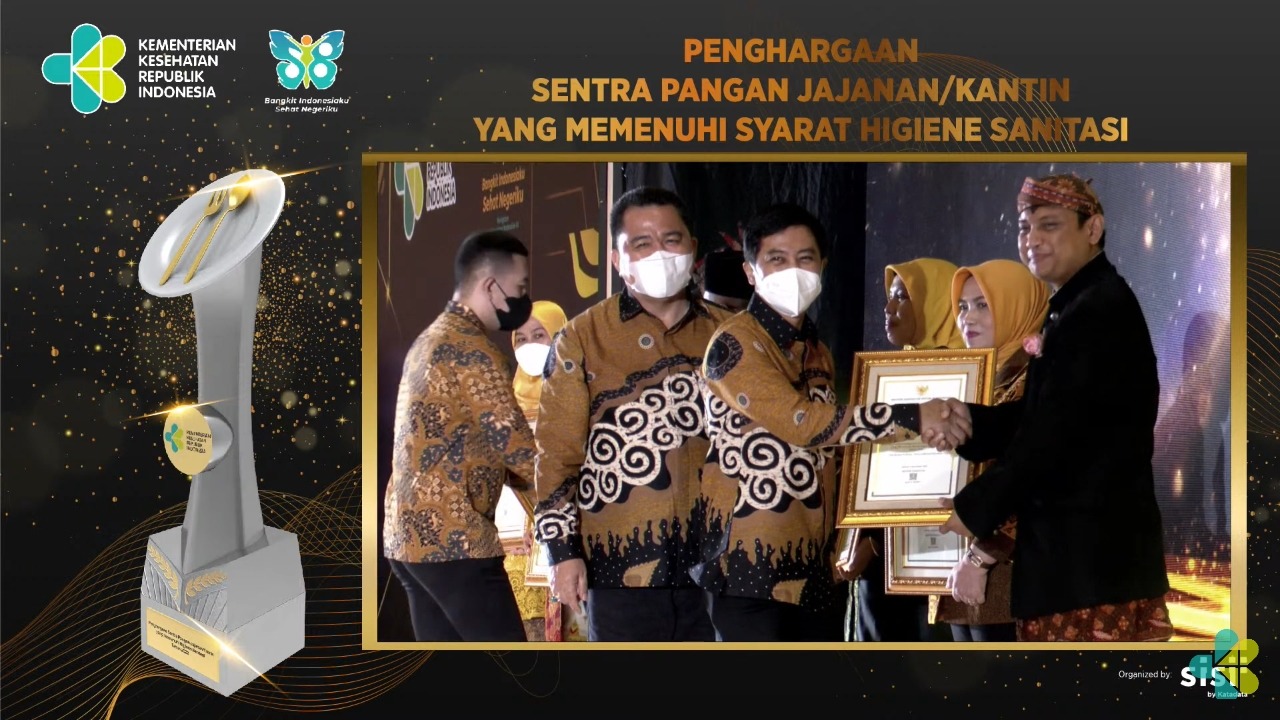

Sustainable Food Choices at ITS Campus
Providing healthy food choices on campus contributes to creating a positive and supportive environment that values the well-being of its community members. It demonstrates a commitment to promoting health and wellness beyond the classroom, fostering a culture that prioritizes physical health and mindful eating habits. Campuses that offer nutritious meal options also contribute to addressing broader public health concerns such as obesity and chronic diseases by encouraging healthier dietary patterns. ITS provides food choices especially healthy food through food outlets from several locations such as central canteen, library canteen, department canteen, etc. ITS also provides food for vegan & vegetarian.



National Hunger
Helping Shrimp Pond Farmers, KKN ITS Designs Photovoltaic-Based Aerator
The use of traditional aerators by shrimp pond farmers requires a significant enough source of electricity, thus reducing the effectiveness of the farmers’ production. Community Services (KKN) Students from the Institut Teknologi Sepuluh Nopember (ITS) have successfully designed a photovoltaic-based aerator to help shrimp pond farmers in Gunung Anyar Tambak Village, Surabaya. With this innovation, they not only increase agricultural productivity but also present an environmentally friendly solution by utilizing solar energy. This aerator reflects a positive collaboration between universities and the community, demonstrating the vital role of universities in advancing the agricultural sector and introducing environmentally friendly technology to farmers. Through this project, ITS students not only gained practical experience in developing technology but also proved that renewable energy-based innovations can empower local communities and stimulate economic growth at the local level.
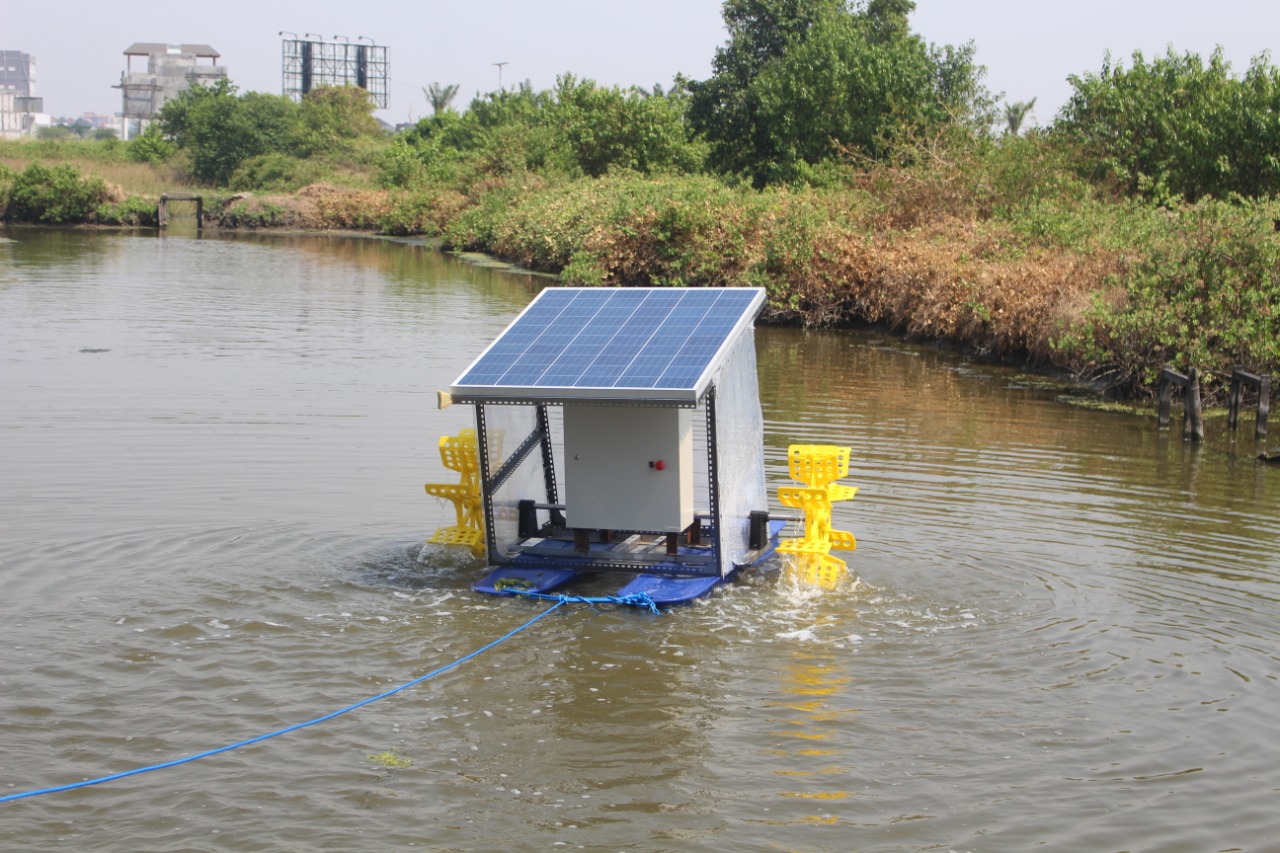

ITS Student Develops Solar-Powered Instore Drying to Help Onion Farmers
The potential of shallot commodities is in danger of experiencing a decrease in quality due to the current extreme weather. To help overcome this, the Institut Teknologi Sepuluh Nopember (ITS), through the Community Service Program (KKN Abmas), created an in-store drying tool with innovative solar panels to maintain quality shallots. This innovation provides an efficient and environmentally friendly solution for drying onions, extending the shelf life of the product, and improving the quality of the harvest. The collaboration between students and onion farmers shows the potential of technology in supporting the local agricultural sector. With this project, ITS students not only explore the potential of solar energy in the context of agriculture but also prove the positive contribution of technology to increasing farmers’ productivity and welfare, as well as educating the public about the benefits of renewable energy in everyday agricultural practices.


Helping Fish Farmers, ITS Abmas Diversifies Patin Cultivation
Looking at the massive consumption of catfish in Indonesia, this potential is likely to support the development of economic areas. However, the empowerment of fish farmers in Bulusari Village, Tulungagung, is considered to have poor planning for fish growth, behavior, and mass production. Seeing this condition, the Community Service team (Abmas) of the Institut Teknologi Sepuluh Nopember (ITS) empowered the village by integrating fish farming with solar panel technology on fish ponds. Not only that, the team also donated several grinding tools for the management of catfish waste, such as the head and thorns. These wastes can later be turned into processed foods, such as catfish crackers and chips. With this milling equipment, the community and Village-Owned Enterprises (BUMDes) can have independent processed products that can be marketed continuously.
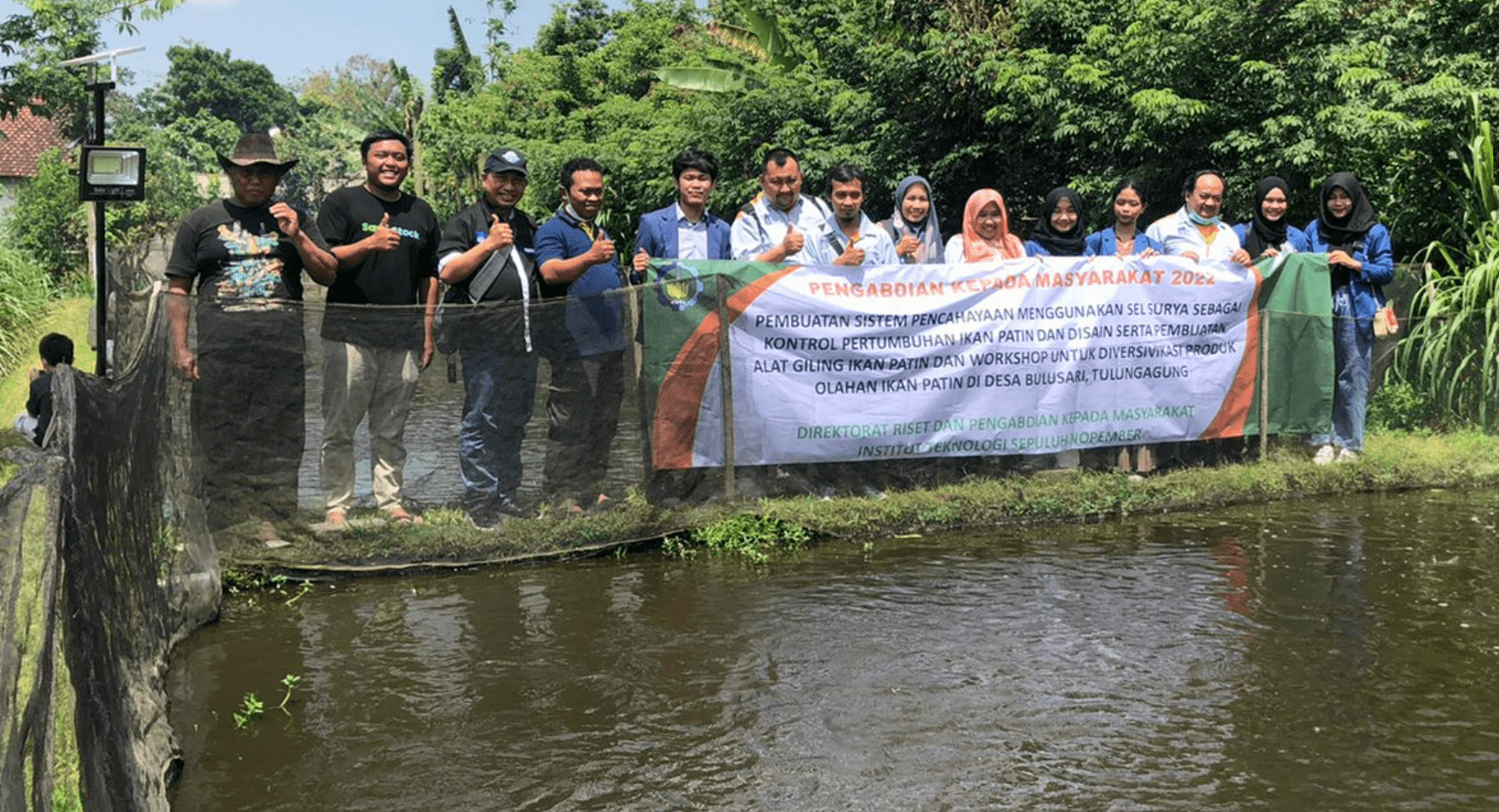

Optimizing Local Resources, ITS Presents TTG and Innovation Corner
Institut Teknologi Sepuluh Nopember (ITS), through the Center for the Study of Public, Business, and Industrial Policy (PKKPBI), established the Appropriate Technology (TTG) to answer some of the concerns experienced by young entrepreneurs in Malang. These concerns include technology and products still classified as conventional, inefficient raw materials, and various other problems. The TTG and Innovation Corner aims to accelerate the downstream of TTG through Village-Owned Enterprises (BUMDes) Malang. Furthermore, The place serves as a forum for developing innovations that the people of Malang will carry out in the future. These initiatives demonstrate ITS’s commitment to promoting innovation, industry collaboration, and local economic development, ultimately contributing to the growth of the surrounding community.
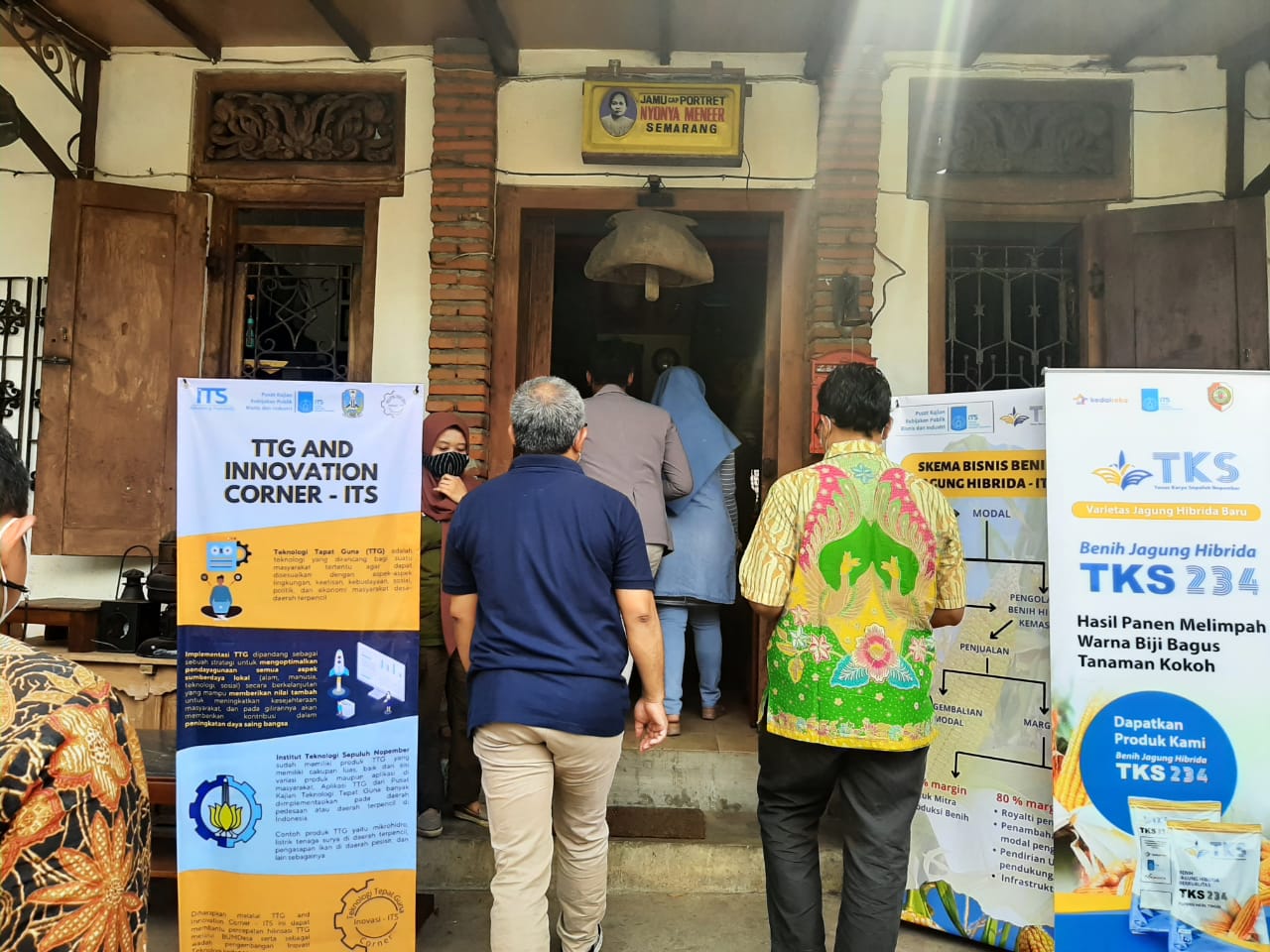


Update SIPETA Features: ITS Fulfills the Needs of Jombang Farmers
To meet the operational needs of the agricultural sector in Jombang district, the research team of the Department of Information Systems, Institut Teknologi Sepuluh Nopember (ITS) held training on the use of the Land Mapping Information System (SIPETA) application. SIPETA is an application based on agricultural land potential mapping information technology to support the operational and strategic systems of the farming industry in supporting the improvement of the effectiveness, efficiency of cultivation, and development of agricultural systems. This innovation results from collaboration between the ITS research team and Brawijaya University (UB), the Jombang Regency Agriculture Office, and the Pojok Kulon Farmer Group Association (Gapoktan). Nine features were introduced to participants, including price information, users, cultivation, infrastructure, operational, strategic, decision support, prediction, and early warning. After the FGD, four additional features were updated in SIPETA, namely agricultural disasters, land management, forum, and geography. Thus, there are currently 13 features that can be used. Besides facilitating operational and strategic farming systems, SIPETA also provides early warning information related to weather forecasts and areas of concern for pest attacks. This shows that the development of the farming system is taking place effectively and efficiently.
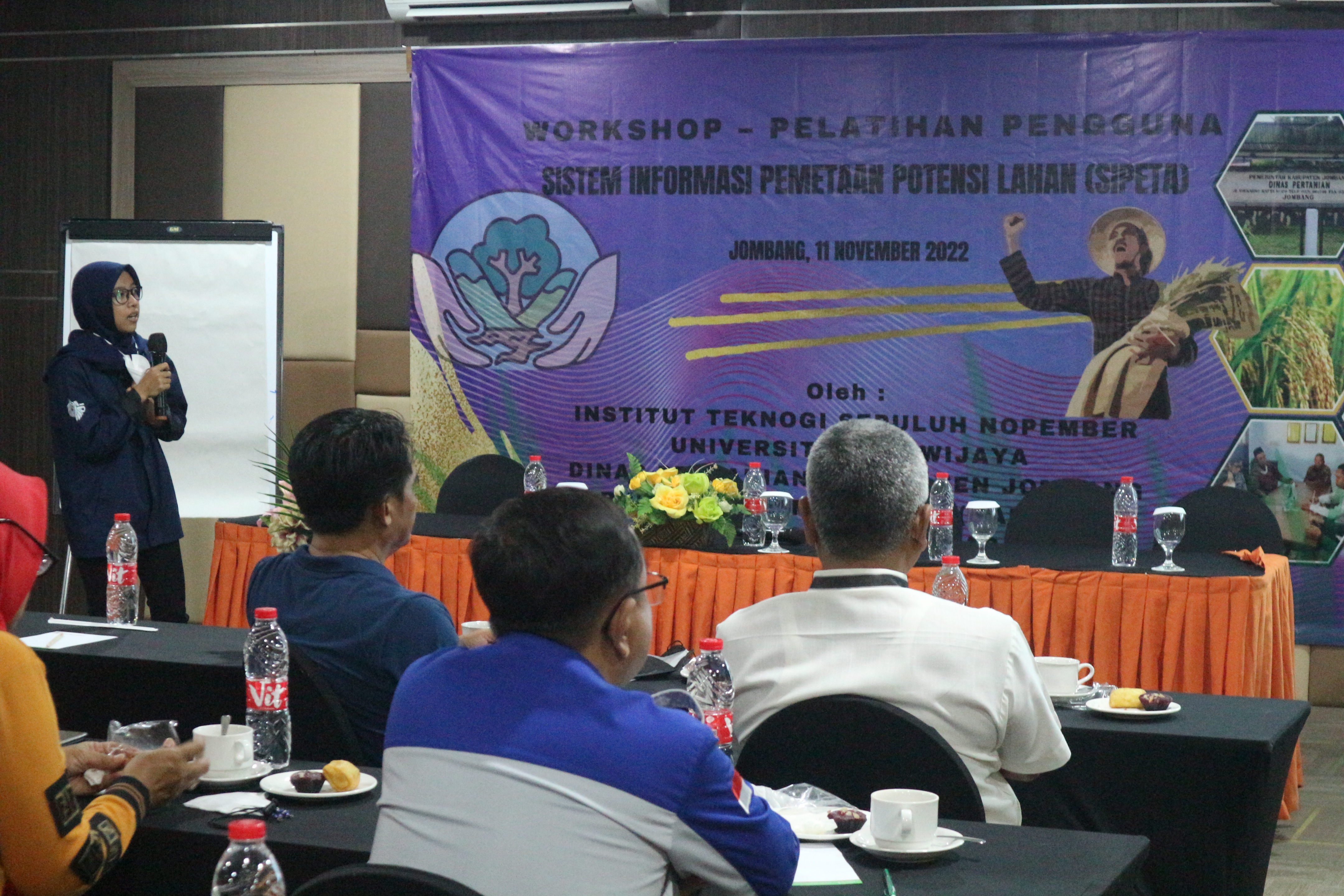


Update SIPETA Features: ITS Fulfills the Needs of Jombang Farmers
To meet the operational needs of the agricultural sector in Jombang district, the research team of the Department of Information Systems, Institut Teknologi Sepuluh Nopember (ITS) held training on the use of the Land Mapping Information System (SIPETA) application. SIPETA is an application based on agricultural land potential mapping information technology to support the operational and strategic systems of the farming industry in supporting the improvement of the effectiveness, efficiency of cultivation, and development of agricultural systems. This innovation results from collaboration between the ITS research team and Brawijaya University (UB), the Jombang Regency Agriculture Office, and the Pojok Kulon Farmer Group Association (Gapoktan). Nine features were introduced to participants, including price information, users, cultivation, infrastructure, operational, strategic, decision support, prediction, and early warning. After the FGD, four additional features were updated in SIPETA, namely agricultural disasters, land management, forum, and geography. Thus, there are currently 13 features that can be used. Besides facilitating operational and strategic farming systems, SIPETA also provides early warning information related to weather forecasts and areas of concern for pest attacks. This shows that the development of the farming system is taking place effectively and efficiently.



Optimizing Local Resources, ITS Presents TTG and Innovation Corner
Institut Teknologi Sepuluh Nopember (ITS), through the Center for the Study of Public, Business, and Industrial Policy (PKKPBI), established the Appropriate Technology (TTG) to answer some of the concerns experienced by young entrepreneurs in Malang. These concerns include technology and products still classified as conventional, inefficient raw materials, and various other problems. The TTG and Innovation Corner aims to accelerate the downstream of TTG through Village-Owned Enterprises (BUMDes) Malang. Furthermore, The place serves as a forum for developing innovations that the people of Malang will carry out in the future. These initiatives demonstrate ITS’s commitment to promoting innovation, industry collaboration, and local economic development, ultimately contributing to the growth of the surrounding community.



Urban Farming at ITS
Institut Teknologi Sepuluh Nopember (ITS) practices urban farming by growing crops and raising livestock on campus, integrating agriculture into the urban setting. ITS emphasizes purchasing from local, sustainable sources, supporting nearby farmers and eco-friendly producers. This approach bolsters the local economy, reduces transportation-related carbon emissions, and promotes sustainable agricultural practices within the community. Following the success of organic vegetable farming, ITS’s Smart Eco Campus Development Team expanded to melon cultivation through the Eco Urban Farming program, which has been ongoing since 2013. Initially focusing on vegetables harvested thrice a week, the program now includes melons and has seen two harvests since June 2022.
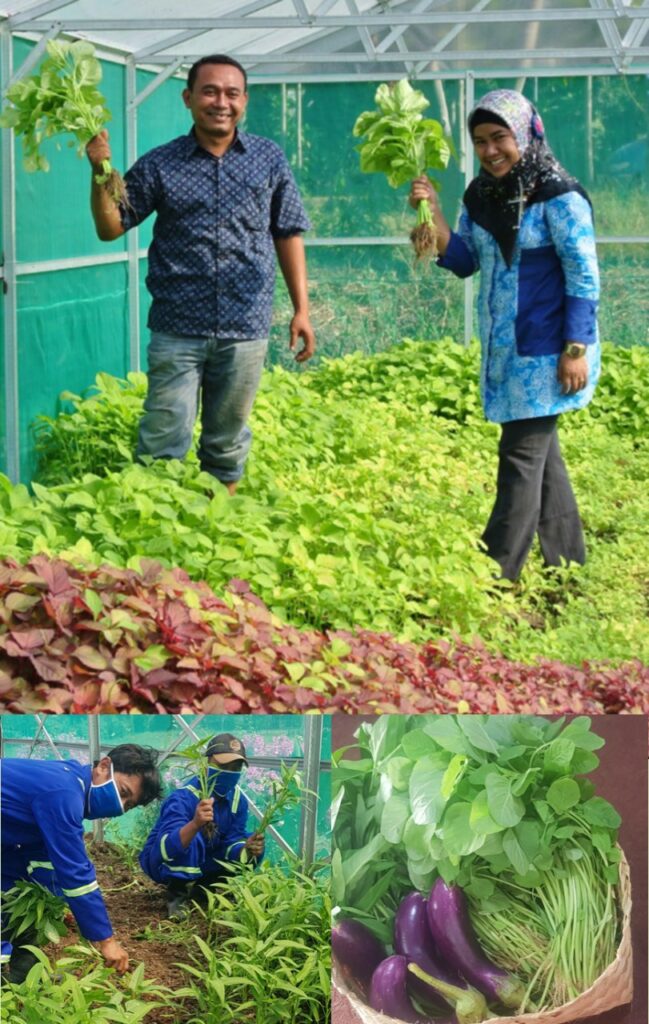

SDG 2 IN NUMBERS
4,301
Number of Graduates in Most Recent Year
N/A
Number of Graduates from Relevant Agriculture Courses
N/A
Percentage of Graduates from Agriculture
131.5 ton
Total Food Waste
22,942
Number of Campus Population
